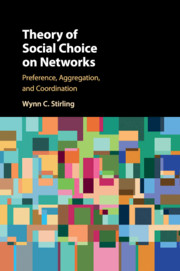Book contents
- Frontmatter
- Dedication
- Contents
- List of Figures
- List of Tables
- Preface and Acknowledgments
- Introduction
- 1 Preference
- 2 Aggregation
- 3 Deliberation
- 4 Coordination
- 5 Randomization
- 6 Satisficing
- Appendix A Dutch Book Theorem
- Appendix B Bayesian Networks
- Appendix C Probability Concepts
- Appendix D Markov Convergence Theorem
- Appendix E Entropy and Mutual Information
- Bibliography
- List of Authors
- Index
6 - Satisficing
Published online by Cambridge University Press: 05 September 2016
- Frontmatter
- Dedication
- Contents
- List of Figures
- List of Tables
- Preface and Acknowledgments
- Introduction
- 1 Preference
- 2 Aggregation
- 3 Deliberation
- 4 Coordination
- 5 Randomization
- 6 Satisficing
- Appendix A Dutch Book Theorem
- Appendix B Bayesian Networks
- Appendix C Probability Concepts
- Appendix D Markov Convergence Theorem
- Appendix E Entropy and Mutual Information
- Bibliography
- List of Authors
- Index
Summary
Rationality, according to some, is an excess of reasonableness. We should be rational enough to confront the problems of life but there is no need to go whole hog. Indeed, doing so is something of a vice.
— Isaac Levi The Covenant of Reason (Cambridge University Press, 1997)Solution Concepts
Optimization is viewed by many as the sine qua non of decision making. It is the ultimate manifestation of narrowly construed selfinterest and, as observed by Tversky and Kahenman (1986, p. 89), “No other theory of judgment and decision can ever match it in scope, power, and simplicity.” Even the great mathematician Leonhard Euler rhapsodized about the principle: “Since the fabric of the world is the most perfect and was established by the wisest Creator, nothing happens in this world in which some reason of maximum or minimum would not come to light” (cited in Polya (1954)). But obsession with this principle is not without critics.
Not too long ago we were content with designing systems which merely met given specifications…. Today, we tend, perhaps, to make a fetish of optimality. If a system is not the “best” in one sense or another, we do not feel satisfied. Indeed, we are apt to place too much confidence in a system that is, in effect, optimal by definition. At present, no completely satisfactory rule for selecting decision functions is available, and it is not very likely that one will be found in the foreseeable future. Perhaps all that we can reasonably expect is a rule which, in a somewhat equivocal manner, would delimit a set of “good” designs for a system (Zadeh, 1958, p. 3).
Perhaps the main virtue of an optimal solution is not that it is the quintessential solution – the best of the best. Rather, optimization provides a systematic mechanism for identifying a solution, such as the calculus-based technique of identifying the maximum of a concave utility function by solving for the value where the first derivative is zero. What is sometimes either ignored or simply assumed is that the real choice confronting the decision maker is the choice of the criterion. Once that is established, identifying the “optimal” solution is, at least conceptually, a straightforward exercise.
- Type
- Chapter
- Information
- Theory of Social Choice on NetworksPreference, Aggregation, and Coordination, pp. 133 - 157Publisher: Cambridge University PressPrint publication year: 2016



